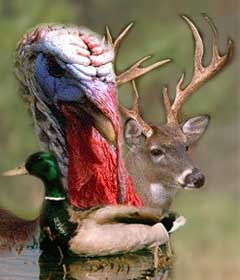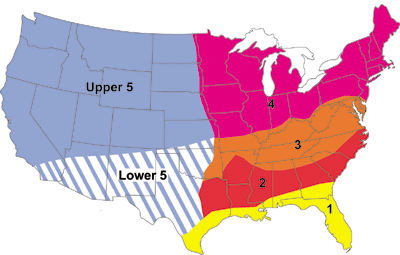
Golden Rule: When in doubt of what, when, where or how to plant, check with your county extension agent or Department of Natural Resources.
When Should I Plant?
Cooper Seed Company wants its customers satisfied and informed! We take
pride in offering the highest quality seed at competitive prices. For
folks planting wildlife food plots, the choices of seed to buy seem
almost endless. Even when deciding on one species, wheat, for example,
there are many varieties to chose from and the decision to buy certified
seed or something cheaper.
Let's see if we can make seed purchasing decisions a little simpler when
buying wheat, rye, oats or ryegrass. Certified seed is inspected by GA
(or other state) Dept. of Agriculture in the field and in the warehouse.
The genetic purity of the variety is guaranteed, it is free of noxious
weeds, conforms to weed free standards, and has a minimum guaranteed
germination level (usually 80-90% depending on the species). Some
varieties are noted for high grazing production, some for seed
production and some for disease resistance.
Combine run seed has no standards, no inspection, no guarantees and no
regulation. Cooper Seed Company does not sell combine run seed. It is
straight from the farmer's combine machine and can be bought in bag or
bulk. Its obviously cheaper but can carry some significant risks that
may affect the success of your food plot. Noxious weeds and other weeds
including little barley, cheatgrass, rescuegrass, wild ryegrass, wild
turnip and dock can sometimes or often times be found mixed with the
small grain seed. These weed seeds got picked by the combine as they
grew with the crop and never got removed. Some can cause serious weed
problems in your plots.
Feed seed or re-cleaned seed is a third category that is cheap but it
also has no regulation, no guaranteed germination and a risk of noxious
weeds. This risk is usually lower than combine run but it depends on if
it has been "cleaned" or not and how it was cleaned. Fans or blowers
alone do a poor job of cleaning seed. Centrifugal cleaning and use of
sieves or screens do a much better job of cleaning and separating seed
by size, shape, and density. Cooper Seed feed seed or re-cleaned seed is
subjected to this multi-stage cleaning process. There are still no
guarantees, however!
Here's some good advice. If you are planting pure small grains or
ryegrass in the same food plots year after year and want to get by as
cheaply as possible, buy re-cleaned feed seed that has been dated for
the current year. Otherwise, if you are mixing in any clovers or if you
expect high production, disease resistance, reseeding, or a perennial
stand (where weeds can be a real problem), stick with certified seed of
a proven variety. Cooper Seed Company has a wide selection for you. Good
luck with your wildlife food plots!
Courtesy of Kent Kammermeyer, Senior Wildlife Biologist, Georgia DNR Wildlife Resources Division,
Special thanks to Kent Kammermeyer and Roy Deason, Forage Specialist, Pennington Seed, for their help with the following planting tips.
August Checklist
Dove Field Management Duck Planting in August
Wild Game Plot Planting Tips
November
January through April
February and March
Planting Dove Fields
You want to plant so that your fields will be ready to bush hog 30 days before the season starts. Mow strips on the outside. Doves love eating fresh cut seed heads off of bare ground.
Wildlife In Mind, Management Practices for High-Quality Habitat
Links to other sites
Zone References Click here to view Cooper's Fall & Early Spring Seed Chart, Check with your local county extension agent and/or Department of Natural Resources for suitable planting dates and other vital information.
Some of the seed varieties we sell have been treated, so please wash your hands after handling. If there are some types of plants or seeds you want and can't find, get in touch with us. Our Guarantee - We want you to be happyCooperseeds.com policy is to offer our customers the highest quality seeds available. We adhere to state and federal seed laws regarding the restriction of weed seeds considered noxious by the U.S. Department of Agriculture. Each lot of seed is tested every 9 months to ensure that the seed we offer for sale retains vitality. All seed is described on the container within recognized tolerances in the trade. This is the sole warranty: We make none, either expressed or implied. We cannot guarantee establishment of plants due of various factors over which we have no control. Seeds not accepted under these terms must be returned within 30 days. Our liability is limited to the purchase price of the seed only. Prices listed do not include shipping and handling. Order Early! Availability of seeds and prices
are subject to change without notice due to reasons beyond our control. |
cooperseeds.com
|


 Click below to view a planting guide based on the zone you live in.
Click below to view a planting guide based on the zone you live in.